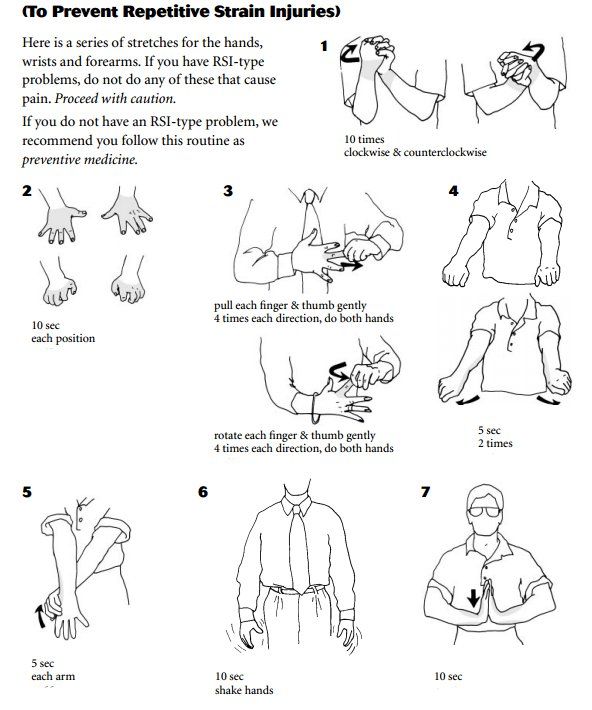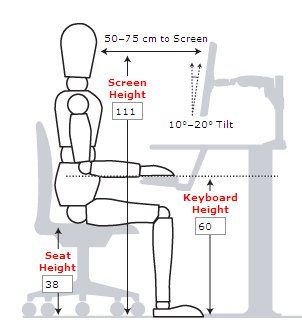I could just do another brain-dump Camp NaNoWriMo post, but this is IMPORTANT!!!
Repetitive strain injury, musculoskeletal disorder,carpal tunnel... All these phrases should strike terror into the hearts of people who sit in front of a computer. Ignore the early warning signs and at some point it's all going to come crashing in on you and even typing a few words will be impossible.
"Yeah, but there's surgery to fix Carpal Tunnel" you might say. A quick Google search will turn up pictures of what happens during that surgery, which is basically cutting your hand open and severing the Metacarpal ligament. I'm a little too squeamish to want to find out whether they put it back together somehow, but the fact remains: they cut your hand open and mess with things. If there's a better solution, I'll take it.
The answer? Stretching. It's not a cure, but it's a treatment. If you're sensible and you start the stretches before you start feeling the symptoms, you might never have problems.
Speaking of the symptoms:
Early RSI Symptoms
- Pain
- Aching
- Tiredness
- These can affect the wrists, arms, shoulders, neck or legs during work
Intermediate RSI Symptoms
- Pain
- Aching
- Tiredness
- Physical signs such as swelling or redness
- These can affect the wrists, arms, shoulders, neck or legs during and after work
- Interrupted sleep due to the symptoms lingering into the night
Stage 3 RSI Symptoms
- Symptoms of pain, aching, weakness and fatigue are experienced even when the person is resting compnetely
- Sleep is disturbed
- The sufferer may be unable to carry out even light tasks at home
Now for the good news :)
Stretching regularly will help. Yes, really. Other things that will help include making sure your typing position is comfortable and taking frequent short breaks.First, the seating position. I found a tool that calculates your ideal desk height and distances here: Comfortable Computing: workspace planner tool. I'm 160cm tall, so here's what my desk should look like:
No, my real-life desk doesn't fit those dimensions. I'm working on it, though.
Now on with the stretches. There's a PDF version linked at the bottom of this post, but I'd like to show them here in the main body as well. DO THESE EVERY DAY, WRITERS!
I know, shouting again. It's impossible to exaggerate the importance of taking these steps towards occuupational health and safety, though. Where are we going to be if we lose the ability to type? Anyway, stretches. Do them.

The PDF version of this is linked at the bottom of the post.
Okay, have you done the stretches yet? Well, what are you waiting for? Your writing career is going to thank you for this somewhere down the line. Mine is already thanking me: I wouldn't be typing this post if I didn't stretch regularly.
(Sources: http://www.rsi-symptoms.org.uk/ and http://www.shelterpub.com/_fitness/_office_fitness_clinic/hwf.pdf)


Great post, Siana. I know from experience that it SUCKS to lose the ability to type.
ReplyDeleteThing is, sometimes the pain comes upon you gradually. Sometimes you're fine one day, but then it suddenly hits you, and you find it very painful to do even the simplest activities. Not being to hold a pen for more than 5 minutes, or cook, or carry things heavier than a novel, or use a mouse, or not being able to grip anything SUCKS!
Writers, it is better to be safe than sorry.